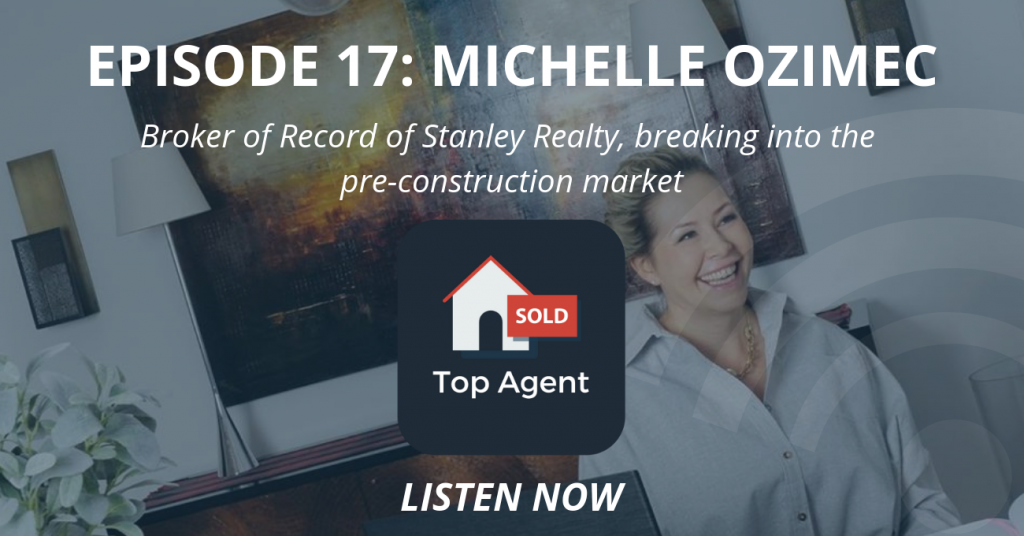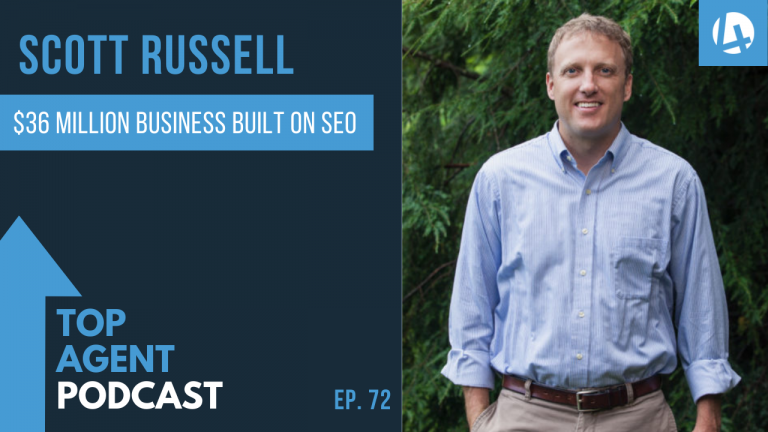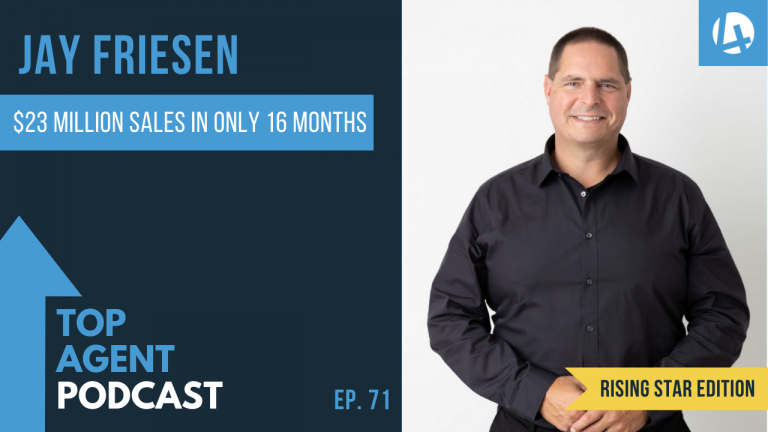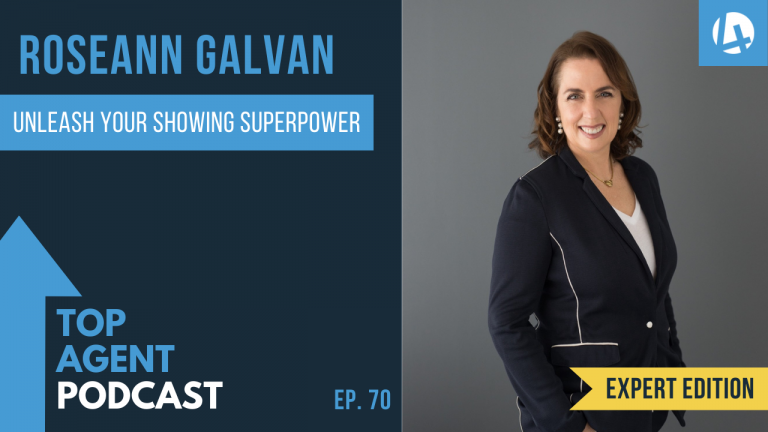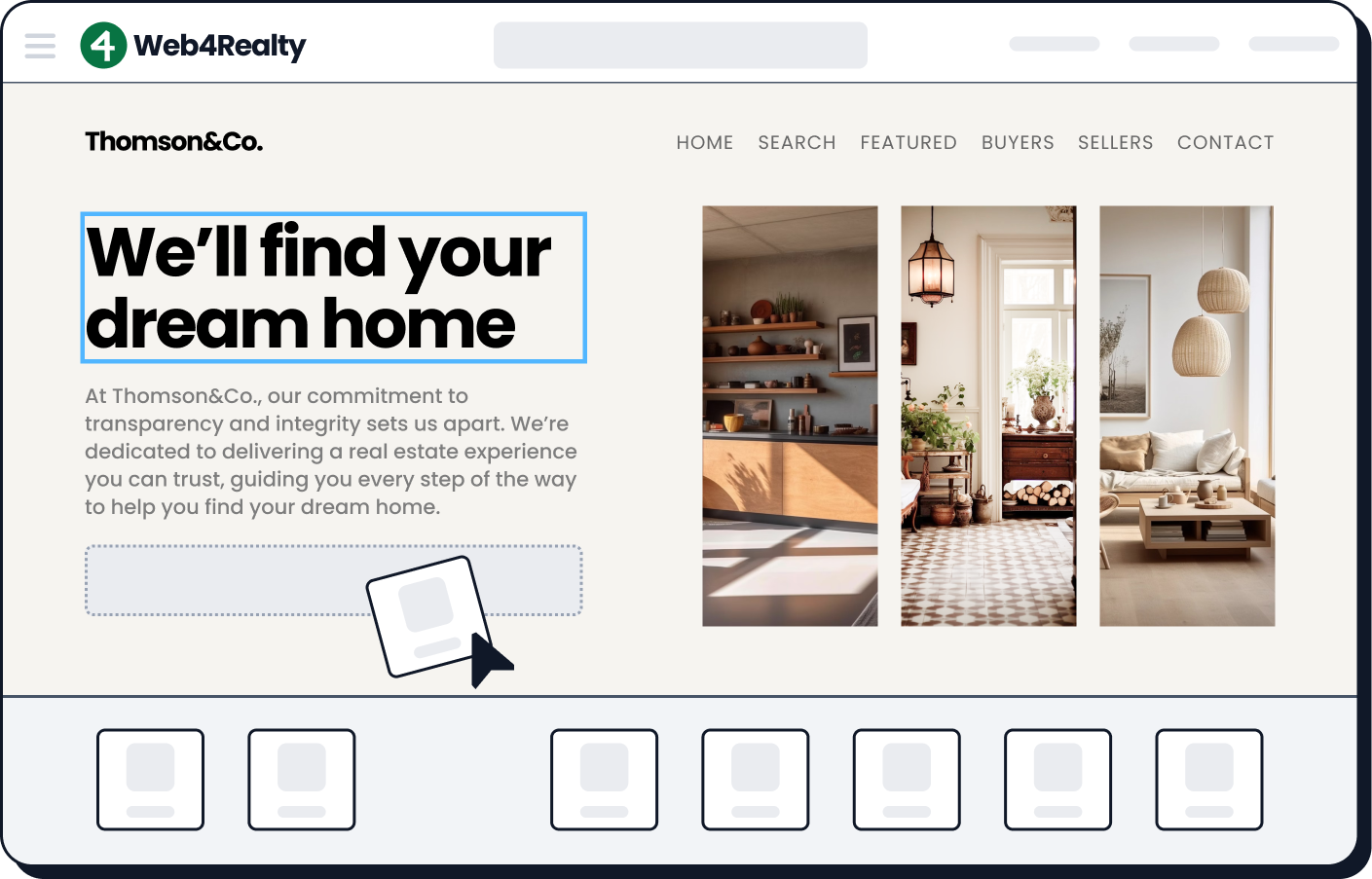Subscribe to Top Agent Podcast on Apple, Google, and Stitcher or take a moment to read the transcript below.
Kosta: In this episode, I’m speaking with Michelle, Ozimec, the broker of record of Stanley Realty a new and independent brokerage with a focus on pre-construction and resale properties. We dive into a lot of topics in this episode, including some tips on how agents can get into pre-construction, selling some of the challenges and selling pre-construction, successful marketing strategies for lead generation and selling, and much, much more. It was such a real pleasure speaking with Michelle, a lot of great value in this episode and I have no doubt you’ll enjoy. So without further ado, here’s my chat with Michelle. Hi Michelle. Thank you so much for joining me on the Top Agent podcast. I’m really excited for you to be here.
Michelle: Thank you for having me. I’m excited to talk to you today.
Kosta: Awesome. So Michelle, you started your real estate career back in 2005. You launched Stanley Realty in 2017 with a desire to offer a unique approach to buying and selling pre-construction and resale homes. Uh, so a few things we’re going to dive into there, but why don’t you kick things off by telling our audience a bit about yourself, your background, and why you got into real estate.
Michelle: Sure. So I started out in healthcare. Um, so I was always people oriented, you know, in that sort of caring field, um, was about to have my first child and needed a little bit more flexibility and possibilities for the future as far as career that could work around kids. Little did I know that it’s very difficult with any career, um, but uh, was really interested, uh, had a very supportive husband at the time who was accepted without me trying something new, um, and wanted to get into the business field. So, uh, from there I went to a mentor and they had a, an established brand, um, as far as a real estate company and got into resale, but they were also able to put me on, um, a few pre-construction sites. So I got my feet wet in both areas early on. Um, I believe I did my first real estate deal about three days after my first son was born, so really jumped in quickly.
Michelle: And then had a really great career with that first brokerage who then opened a pre-construction dedicated brokerage, um, at the same time. So I was able to flip back and do resale and reconstruction and always able to offer that as far as tools to. And that office offered the best of both worlds. Uh, from there I went and worked directly for a very large home builder and got to see the inner workings of a home building company. Uh, the challenges they face, the opportunities as well as some really high tech marketing systems. And then a left there about just over a year ago. Um, because I wanted to take on a new challenge and also help educate and mentor other agents. That’s really my forte is that a mentoring and educating and bringing new opportunities and brainstorming with new agents as well as established agents, just about what’s, what works, what’s happening in the market and what we can do better. So with Stanley, the uh, the goal was to offer agents different tools in the repertoire. So even in a slower resale cycle, perhaps they had opportunities to take investors to pre-construction projects, condos and so forth. So that was the, that was the goal of Stanley.
Kosta: Awesome. Thank you so much for sharing that. So that’s unique. Stanley realty has a focus, I guess, on the pre-construction market. Can you talk a bit more about that? Like exactly what void in the market is Stanley realty filling currently?
Michelle: Sure. So when consumers go to a typical sales office for a builder, it can be a little overwhelming. The contracts are longer, there’s a lot more legal jargon that is specific to the builder side of things and they’re made that way and their standard forms and the builders are fair, but it’s, it’s hard to really get through all of that documentation. A realtors are able to consult, help their clients look at some potential issues or potential benefits. It’s a totally different contract. It requires a different understanding of some of those terms like Terry on warranties, I’m warning clauses just how the deposits are laid out. Uh, and where the deposits set. There’s a, there are a lot of different items and that agreement compared to the typical resale agreement and we were finding also be working on the builder side of things that clients were asking their agents to bring them to a sales office.
Michelle: But the agent, we’re agents we’re on always equipped and not their fault. It’s just not taught really in a Ria, um, or Rico, that there is a special knowledge base that’s associated with pre-construction homes and the APS and the cooling off period. If it’s Condo, there are a ton of different, uh, it would say definitions and information that clients are able to rely now on a real estate agent who’s educated in that field to take them into a sales office and represent them on the buyer’s side. So they have a concert, a consultant, they have sort of a liaison and advisor who is able to help them select the floor plans, look at it if it’s an investment or if they’re going to be living there. If you’re buying for their kids a future, you know, what they can expect on the investment, what the rents might be a. So there are a lot of different factors that play into purchasing pre-construction that an agent who specializes in that field or as knowledge in that field is able to assist them.
Kosta: Yeah, it makes sense. It makes total sense. My first home purchase was a pre-construction as well. So yeah, I totally get the, the different types of contracts and jargon and all that. Um, I, I’d imagine I’m networking and sort of knowing the right people, like builders for example, is extremely important in being successful in this type of pre-construction selling. Can you talk a bit about that?
Michelle: Yeah, absolutely. So first knowledge of the product and the project is crucial. So when you’re bringing your clients to a site, knowing a bit about the builder story, a knowing you know, what other projects they’ve constructed, the quality of their workmanship, a do they have service issues, knowing all of that and becoming comfortable and aligning with certain builders is or understanding their product really well allows you to create relationships and bring more buyers to their, their projects. They recognize that they recognize agents who support them. Uh, they recognize agents who are around and pushing their product in slower times and they’re able to connect really with the, with the sales reps on the sales floor. They’re developing relationships and rapport. As soon as they walk in that door, they want to, they want the best deal for their client. The builder wants to do the deal and the sales rep on the floor is really supposed to be there to help both the agent and the buyer get to what they need. Of course they’re representing the builder, but everybody wants, you know, a great transaction and once the buyer to be happy and wants those referrals as far as being bolder. So starting off building your relationships with the agents on site, I’m attending special events, I’m getting in front of those builders. They see your name on broker co-op’s is where they’re going to recognize it the most and just making sure that you’re knowledgeable about the product so you’re setting realistic expectations and then there are problems with the builder and communication with head office perhaps later on.
Kosta: Yeah, makes sense. Thanks for sharing that. The question I have for you, so you know, as you know, real estate, usually a very emotional purchase for a lot of people in compared to resale where a buyer can sort of walk into a home, check it out, touch it, smell it for you at any pre-construction. The buyer can’t experience those things. Do you ever find that as a hurdle for some people and if so, how do you overcome that?
Michelle: Yeah, absolutely. Some people have difficulty visualizing their living space from a plan a and most of the floor plans or black lines, they’re very basic. They may have some furniture drawn on for, you know, space measurements. But really it’s about aspirational selling and really creating the vision and the picture for these buyers who are going to perhaps move in in two years in some cases, maybe longer, maybe a year. It might be their first home, maybe their move up home or they’re downsizing and which case they’ve got a lot of furniture that they may be moving into, you know, a two plus den or a town home. So really being able to paint that picture, walking them through a sales office in a model suite and saying, you know, this, uh, this room is 10 by 10, um, this is averaging in bedroom sizes in this building.
Michelle: So you can see yourself in a one bedroom, one plus den, a two plus dad. Just, you know, I guess drawing comparisons to the space. And then looking at the finishes and knowing that if there are standards being offered across the market or if there upgrades and that’s a benefit, but the builders offering upgraded finishes and those are really selling points, but there are some tools that builders are incorporating into their sales offices, uh, there are spins you can do with the digital building where you can actually figure out which unit you’re in, on the digital model and what your view is going to be. So it just takes you to that next level of understanding when I step out on my balcony or when I go out on my terrorist, this is what I’m going to be looking at. This is my future view. So that brings them a little bit closer, a little bit. There’s an emotional connection. They can actually see themselves living in that, in that suite or that, that home.
Kosta: Yeah, for sure. I was just going to ask you on that, like augmented reality and being greedy like renderings of the house and sort of walk through it almost.
Michelle: Absolutely. So yeah, and there’s more technology coming out about with drones and Vr, which would be really helpful, especially Vr if you’re looking at reconstruction, that’s to be built and you can get a really good system and really visualize what your space is going to be looking like. Even digital staging is very helpful and digital renderings of the space and what the finishes could look like, like even when you’re bringing the light in through the windows on a rendering, it really affects the feel and the emotional connection that a buyer might have to that plan.
Kosta: No, I agree. That’s super helpful. For sure. Um, are there any other challenges that you can think of when selling a pre-construction home?
Michelle: Um, challenges for pre-construction. I would maybe say, um, the buyer’s expectation and lack of knowledge just because it may be a very new process. Um, you know, sometimes the deposits, the staging of the deposits, if they’re, if they’re really tight, if you’re an investor, you’re looking at putting down 20 percent and depending on when that timing has to come in for the builder, it can be a little tougher as far as cashflow. So understanding budgeting and future payments and how that’s gonna Affect you know, payments that they have going on. So really being in tune with the buyer’s life and on what’s going on with them at the time so that they can, you know, make sure that they can afford those deposits, get that mortgage approval and close on the property. So, and there’s a longer time period and builders have different requirements based on mortgage approvals and financing. So that part you really have to hand hold some times and that’s part of our job is to make sure that the buyers that we’re bringing to these projects can afford them and can close because they are so far away. Right. And it is aspirational and sometimes you hope in the future that, you know, this is my plan, this is what I want to save a. But you really have to be sure that you can afford that in two years.
Kosta: Yeah, that makes sense. So, so if an agent listening to this, you know, is interested or wanted to get into pre-construction sewing or become a vip agent with builders, what are some of the steps or advice you would give?
Michelle: So first I would make sure that they visit a few sales offices, a walk into a sales office. She noticed the experience noticed, if you know, when you’re greeted at the door, notice the relationships that and their response to a op culture. Um, most are very pleasant and inviting. Um, any you can ask questions and educate yourself on just the basics of pre-construction before bringing a client. And it’s really important to be prepared. Um, so visit a few sales offices and different types of product. I would definitely visit a Condo, you know, detached home, town houses and townhouses. Make sure that you register for various projects. So depending on if you have an area of specialty or a product that you’d like to really promote or you understand really well and you feel you can sell well, make sure that you register with the builder as a broker so that.
Michelle: And sometimes you get advanced access and knowledge about these projects, so just make sure that you register so that you can get those notifications and then prepare your clients, talk about pre-construction, talk about the benefits, help them understand before they go to the sales office, um, and then make sure you’re aligned with a company that can support pre-construction and understands the paperwork there, their gl secretary can process it, understands front ends and back ends. All of those things that realtors need to worry about the payment and advances and just make sure that you have a supportive setting and people you can ask questions if, if the builders not available, somebody can fall back on
Kosta: Solid advice. I remember when I bought my pre-construction home maybe like five years ago, uh, I believe that I, like, I wasn’t allowed to or a buyer agent wasn’t allowed to come in. Is that generally still the case?
Michelle: They weren’t allowed to come in. Sometimes it’s rare, but it’s sometimes, depending on the market. Most cases builders don’t cooperate with agents. I’m not aware of a time unless it was a special event. Sometimes they’ll segment their databases, they’ll work with brokers, then they’ll work with their via, they’re registering. So those are basically general, general registrant’s not agents, and they may section it off that agents are now not allowed that day or they’re not allowed to come, just they don’t want perhaps agents speaking to their clients in, you know, in line. Um, but if that doesn’t happen often.
Kosta: Okay, makes sense. Switching gears a little bit. So selling real estate has a lot to do with marketing as you know. So what are some of your favorite marketing strategies when selling a home for a client?
Michelle: So I like networking. I like face to face. I like meeting New People and talking and, you know, word of mouth, um, you know, what’s happening in the market. What are you saying? I love my favorite right now, which I was afraid of at first, his instagram. Um, I think that building your brand as an individual, um, for me it’s our brand as stanley being that indie brand and being something different. Um, but I think that social media is really important. Understanding which social media platforms are better for advertising or promotions and which ones are better for just being yourself and letting people see how, you know, your authenticity I think is really, really important. Um, most people are looking for relationships, they’re looking for a fit and a vibe. Um, they know a ton of realtors, but making sure that you’re coming across as somebody that they would want to align with.
Kosta: Yeah, for sure. I mean realtor, there’s so much more to real estate than just selling. I mean the whole gamut of things for, you know, from marketing and brand awareness and yeah, good point. What about on the other side of marketing, what are some of the successful ways that attract new leads and new business they’re able to share? I know you mentioned social media. Is that a huge driving factor for you, for Your Business?
Michelle: It is. We, we’ve developed a lot of awareness. We’ve also done some ads and retargeting. Seo, I’m just for awareness because we are new. It wasn’t really about lead generation for us at the beginning, but we have handled a number of discussions and mastermind sessions with our agents about lead generation, so especially in pre-construction, I’ve seen some amazing, amazing models of a lead generation seo and Google ads and, and it’s really a science that they’ve got it down to and I won’t give all the secrets right now, uh, but they, they do spend, but you have to make sure that you’re spending in the right places at the right time and at the right stages of the development. So that’s usually where it’s crucial as before the public has access. The agent is invaluable as far as getting them in there as a vip.
Kosta: Yeah, definitely a lot of opportunity for sure. Um, technology as we all know, changing rapidly. We touched on earlier about augmented reality and Vr for example. I’m sure the way you do business today is very different, different than a decade ago. So how do you decide what tools and apps to use in your business?
Michelle: So it’s really about user experience. So if it’s convenient and it’s easy for agents and our clients to use, then it’s a win. Um, if it’s convenient and it’s cumbersome and it’s difficult to access and those sorts of things, then it’s just not going to work. It has to be about the user experience on both sides to make sure that, you know, our buyers have an easy time of perhaps, I don’t know, signing from overseas, authentic sign, um, has been amazing in our office. Um, docu sign, those types of platforms. They really have allowed agents to get to more people faster. Um, we try not to use it as the removal of a face to face and relationship and contact, but it really is imperative for so many people, especially if they’re on shifts or their country or their vacation and they work remotely. People are moving around a lot every day. So that tool has been amazing. I’m so remote signing and then also, um, we hear a little bit, I think there was an article recently about cryptocurrency perhaps creeping into real estate and I have attended a few seminars and just trying to wrap my head around how that would be possible in the future, but I’ll be watching that closely. Crypto and exchange platforms should be interesting if they’re able to apply it to real estate.
Kosta: Yeah, a couple of good foot. Yeah, I totally agree about user experience, uh, with apps or just making things easy to use for not only yourself but for your clients and buyers and sellers. So I think that’s a huge factor and yeah, it’s funny you mentioned about crypto currency. Um, I think early, I think maybe in the summer or spring of this year. Uh, I was reading in Toronto, a house was listed in bitcoin. Yes. I’m not sure if it actually sold in bitcoin or, or what happened. I don’t know if you have any information on that.
Michelle: I don’t, I, I watched a program a little bit about it. I’m a real estate company that was, I think they were doing auctions, but I don’t know, I think that they were doing it online, but I’m not exactly sure the system that they were using. Um, but yeah, you never know. Things have changed so dramatically with those currencies in the last few years that who knows what they can come up with.
Kosta: Yeah, exactly. Yeah, definitely something to you and just keep your eye on for sure. Yeah, sure. So I’m a numbers guy. I Love Julian getting into revenue commissions, all the fun stuff. Are you able to share with our audience how many transactions your brokerage has closed in the last 12 months or projects the closed in the next?
Michelle: Um, so we’re fairly new. Um, so we’ve got about, I would say about 25. Um, and we’re looking to minimum at minimum double that in the following year, but our agents who are doing pre-construction, I need the volumes depending on their database and the access that they get. And if they get allocations, those numbers are small for them. Um, there are some who are trading and doing upwards of 100 deals, 200 deals a year, uh, on pre-construction because they’ve just established an amazing database of investors and end users all over the southwest Ontario in Toronto.
Kosta: Perfect big time numbers. Thanks for sharing that. Um, what’s the one piece of advice you would give to a realtor who’s deciding on what company or brokerage to work with?
Michelle: So I, there are so many questions that new agents have and I love the questions because they challenged me to make my company and our programs better. Uh, but overall I think the agents who have joined Stanley so far, and what I’m really trying to bring ’em to the real estate industry is it’s just, it’s different. It’s a more open, a less competitive, more collaborative environment where they’re not afraid to ask questions. For new agents, it’s really important to be approachable. Uh, you make a mistake and it can cause someone money. And your confidence level when you’re first out of school is fragile. You need those experiences and you need someone to lead you through so that you can build that confidence there. You can have an amazing career in real estate, and if you line yourself up with a good mentor, the sky’s the limit. Uh, but here it’s really about fit by energy and respect for everyone we work with and for
Kosta: Sound advice. Those are all very important. I think. I totally agree. Um, so Michelle, I do want to be mindful of your time. Uh, I do end off each chat with what I call the top three. Are you ready? Yes. Okay. Number one, your favorite real estate or business book?
Michelle: Uh, I don’t know if it falls into this category, but the secret. I’m all about what you put out there and you get back.
Kosta: Yeah, that’s a, that’s a popular one when I asked that question for sure. Great Book, Great Book for sure. A number to your vacation spot or a favorite vacation spot, Croatia, Croatia. Is that your background?
Michelle: My husband is, and he introduced me to that culture a long time ago and I fell in love when I went there. It’s beautiful,
Kosta: Amazing. And last question, if you could go back, what do you wish your 20 year old self knew?
Michelle: Uh, that it’s okay to be tough. Sometimes
Kosta: it’s okay to be tough sometimes. Personally, don’t take crap sometimes. Absolutely. Great Advice. Great Advice. Um, and if someone wants to reach out or get a hold of you, where’s the best place they can find you?
Michelle: Uh, our website or our po number. Do you want me to give you the phone number?
Kosta: You could, but I’ll add it all in the show notes.
Michelle: It’s as well, so it will be accessible on our website. You can send just a contact form and it’s got all of our address and phone number there were always available and we have great response rate, so anytime.
Kosta: Perfect. Alright, Michelle, thank you so much for joining me again. I really enjoyed our chat. Thank you so much. We should definitely do this again sometime.
Michelle: Sounds good. Thank you so much for having me. All right. All the best. Take care.
Kosta: Thank you so much for listening to the Top Agent podcast by Web4Realty. By the way, we’re providing exclusive promos to our listeners, visit web4realty.com/topagent and get your first month on us, that’s web4realty.com/topagent to get your first month of service completely free. Until next time. Over and out. Peace.
